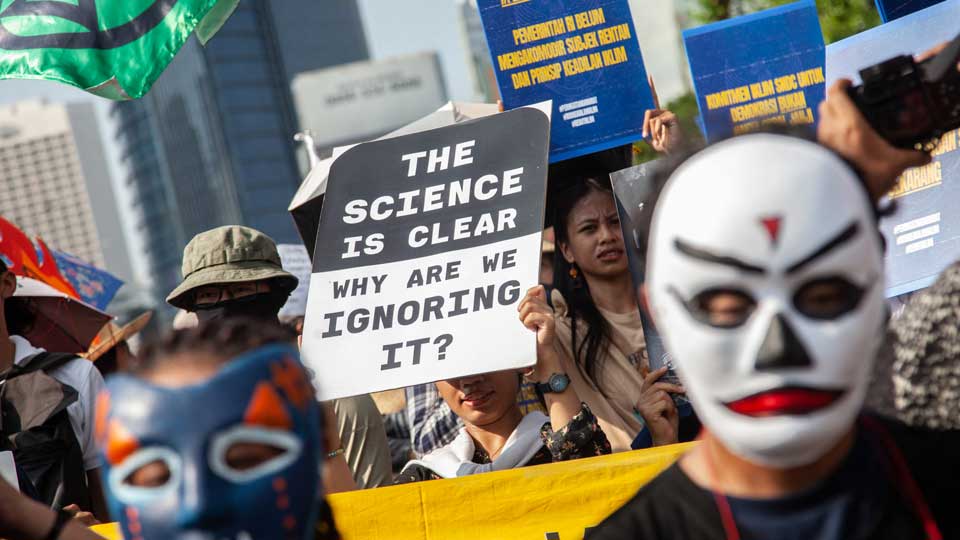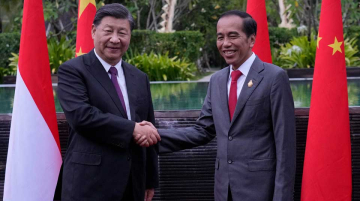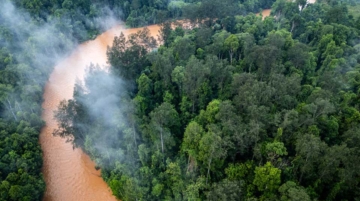
The climate crisis is already happening. It has caused disasters in various parts of the world. A report published by the national news network KOMPAS in early October sounded the alarm over the accelerating damage climate change has on developing countries. The news revealed that river flows worldwide shrank to their lowest point last year amid record-high heat. This report makes efforts to control greenhouse gas (GHG) emissions undelayable.
Rich countries must be held accountable for polluting the atmosphere. These countries have ecological sins because they have already caused much damage to the earth’s atmosphere with GHG emissions for the benefit of their industries.
According to Statistical Review of World Energy 2024 data, China ranks first in polluting the earth’s atmosphere with GHG, with 11,218.4 million tons of carbon dioxide equivalent. Second place is occupied by the United States (4,639.7 million tons of carbon dioxide equivalent), India (2,595.6 million tons of carbon dioxide equivalent), Russia (1,614.7 million tons of carbon dioxide equivalent) and Japan (1,012.8 million tons of carbon dioxide equivalent).
To pay for their ecological sins, these developed countries must reduce GHG emissions in their own countries and also invest in developing countries, including Indonesia, for energy transition. The United States, the United Kingdom, Germany, and other developed countries outside China are very active in providing assistance and investment in renewable energy in Indonesia. IESR data reveals that the total value of their financial support reaches at least USD 14 billion (including USD 1 billion from the UK’s commitment under the Just Transition Energy Transition Partnership/JETP).
China also does not want to be left behind in investing in Indonesia’s energy transition. As revealed in the metadata report, Chinese investment in Indonesia’s energy sector from 2006 to 2022 reached US$8.9 million, or around Rp 93 trillion. Of this investment, 14% is for energy transition.
From an economic perspective, Indonesia will receive a lot of investment in the energy transition sector. The question is, will investment in this sector impact the welfare of the people at the grassroots level? The short answer is not necessarily.
Investments related to the energy transition from Western countries in Indonesia prioritize large-scale energy development. The priority for large-scale renewable energy development is also reflected in the CIPP (Comprehensive Investment and Policy Plan)-JETP in 2023. One of the priorities for large-scale renewable energy development is geothermal power plants.
Local residents often reject geothermal development in Indonesia. It causes agrarian conflicts and human rights violations. Communities from various regions have expressed their rejection of geothermal projects.
In Poco Leok, Flores, East Nusa Tenggara (NTT), for example, local residents, including indigenous people, reject a geothermal project that is planned to receive funding from Bank Kreditanstalt für Wiederaufbau (KfW). In early October, several elements of the civil society movement, including Indigenous people, sent an open letter to the German development bank (KfW) regarding the project’s human rights violations.
If the energy transition projects funded by Western countries bring disaster to local communities, what about the green energy projects funded by China? Unfortunately, almost every large-scale green energy project, whether from Western countries or China, also adversely impacts local communities.
One of China’s major investments in energy transition is in Indonesia in nickel for electric vehicle raw materials. One of its investments is the Indonesia Weda Bay Industrial Park (IWIP). According to Climate Rights International, at least 5,331 hectares of tropical forest have been cleared within nickel mining concessions in Halmahera, resulting in the loss of an estimated 2.04 metric tons of greenhouse gases (CO2e) previously stored as carbon in the forests. IWIP is a conglomerate of three private companies headquartered in the People’s Republic of China: Tsingshan Holding Group, Huayou Cobalt Group, and Zhenshi Holding Group.
Another Chinese investment related to the energy transition is on Rempang Island. The Indonesian government in 2023 revealed that it had revealed the investment plan of the Chinese company Xinyi Group on Rempang Island. The Chinese investor reached IDR 174 trillion. The investment will include ten projects that will be built in stages. One of them is the solar panel glass industry. However, the construction of the eco-city in Rempang was rejected by the local community. The indigenous people of Kampung Melayu Tua, who have inhabited the Rempang Island area for decades, refused to be evicted because of the eco-city project.
The large-scale energy transition-related investments from Western countries and China show that Indonesia has become a new battleground for their interests. The battle between their energy and economic interests, on the one hand, may contribute to increasing Indonesia’s economic growth. However, it also harms local communities.
Large-scale energy transition projects, both from Western countries and China, have the potential to damage nature and remove local communities from their sources of life. In the context of climate change issues, this situation weakens the capacity of local communities to adapt to environmental changes. This means that when disasters occur due to the climate crisis, they become more vulnerable to becoming victims.
Soon, Indonesia will have a new government. The issue of proxy wars related to the energy transition between Western countries and China in Indonesia must be an important agenda to be resolved. Both parties’ interests can potentially harm the community at the local level. The Indonesian government must re-interpret the energy transition, not just follow the interests of Western countries and China. Indonesia must let go of the hegemony of the energy transition between Western countries and China. Several policies related to their energy transition investments in Indonesia need to be reviewed.
Firdaus Cahyadi is a longtime environmental consultant and a regular columnist for several of Indonesia’s largest news publications.







